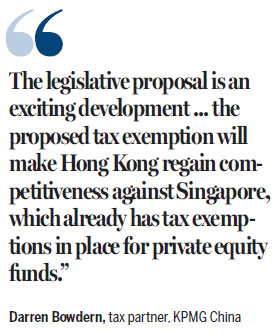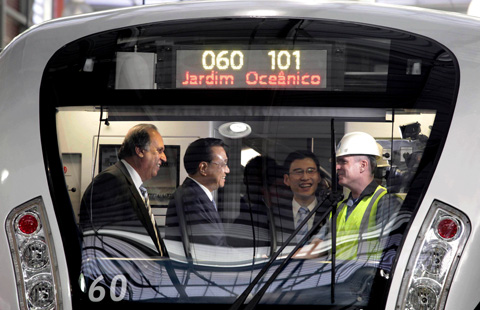Waiting for the scales to tip
Updated: 2015-05-22 15:02
By Oswald Chan(China Daily USA )
|
||||||||
Hong Kong's position as Asia's leading private equity fund-raising hub would be further cemented if proposed legislation to extend tax exemption to offshore private equity funds can be enacted this year. Oswald Chan reports.
The government on March 25 tabled in the Legislative Council its gazetted Inland Revenue (Amendment) Bill 2015, which seeks, among other things, to amend the Inland Revenue Ordinance (IRO) so that profits tax exemption for offshore funds may be extended to private equity (PE) funds as well.
Hopes are that the amendment can be passed within this year.

This came after Financial Secretary John Tsang Chun-wah announced in the 2013-14 Budget that the administration would consult the fund management industry on making legislative changes to encourage PE funds to expand their business in the city.
The current taxation regime for PE funds is based on the 2006 IRO amendment, which stipulates that profits tax exemption for offshore funds can only be allowed when profits are "derived from specific transactions carried out through or arranged by a specified person, and transactions incidental to the carrying out of the specified transactions".
The government has proposed three main areas of legislative amendment to boost PE industry competitiveness in the city.
The first proposed change involves extending profits tax exemption for offshore PE funds to conduct transactions in private companies incorporated outside Hong Kong.
This will allow offshore PE funds to enjoy the same exemption under the IRO as those currently available to other offshore funds.
Time for change
Under the 2006 amendment, "specific transactions" cover financial transactions in listed securities, futures contracts, foreign-exchange contracts, foreign currencies, bonds, exchange-traded commodities and deposits - but not such transactions in eligible private companies.
In other words, offshore private equity funds that derive profits from transactions in private companies could be subjected to Hong Kong profits tax.
The second amendment proposes to waive the requirement for PE investments to be arranged by or carried out through Securities and Futures Commission (SFC) licensed persons. Many offshore PE fund firms operating in Hong Kong are not necessarily managed by "specified persons" licensed by the SFC under the Securities and Futures Ordinance.

The amendment would allow profits tax exemption to be available to qualified offshore PE funds, which can be defined as funds that have five or more investors who collectively committed more than 90 percent of the fund capital.
In addition, the originator of the funds should not be entitled to receive more than 30 percent of the net proceeds arising from the fund transactions.
"The extension of profits tax exemption to PE will broaden Hong Kong's fund management business, boosting Hong Kong's reputation as a full-service asset management hub," SAR finance chief Tsang told participants at the Asian Financial Forum 2015 in January.
"It will also expand demand for business consulting, tax, accounting and legal experts in Hong Kong."
Uncertain no more
The accounting sector welcomed the proposed amendment, saying it will create a level playing field for PE fund managers compared with other hedge funds.
"The amendment will remove taxation issue uncertainty for PE fund managers. Once the new amendment is passed, the new legislation will be very simple and feasible for PE fund managers to manage tax-risk exposures," David Kan Kau-hang, a tax partner at PricewaterhouseCoopers Hong Kong, told China Daily.
And KPMG China Tax Partner Darren Bowdern said: "The legislative proposal is an exciting development for the industry in Hong Kong, as the proposed tax exemption will make Hong Kong regain competitiveness against Singapore, which already has tax exemptions in place for PE funds."
"After the enactment of the new legislation, Hong Kong is likely to become the preferred place for PE funds because of its robust financial infrastructure and geographical proximity to the mainland," Bowdern added in speaking to China Daily.

A third proposed modification aims to introduce tax exemption for special purpose vehicles (SPVs), as many PE funds may use multi-level SPV holding structures for investments.
SPVs are defined to include corporations, partnerships, trustees and non-corporate bodies established for the sole purpose of investing in private companies and not able to carry on any other trade or activity.
Allowing profits tax exemption for SPVs will strengthen the ability of offshore PE funds to use Hong Kong companies as a platform for holding offshore investments, thus bolstering Hong Kong's status as an investment holding jurisdiction and helping the SAR level the playing field with Singapore, "Big Four" accounting firm KPMG said in its "Hong Kong Tax Alert" document in January.
Hong Kong's sound legal and financial infrastructure, freedom of capital movement, a free convertible currency and strong geographical proximity to the mainland make the city one of the preferred locations for foreign PE investment capital.
Leader in the wings
According to government statistics, there were 390 PE companies operating in Hong Kong with $114.6 billion of capital under management as at end-2014, accounting for 21 percent of Asia's total capital under management in private equity.
The PE industry's total capital under management in Hong Kong grew 16 percent annually last year.
Over 70 percent of Hong Kong's fund business comes from non-Hong Kong investors, and fund managers invest almost 80 percent of clients' funds outside Hong Kong, government statistics reveal.
In the three years between 2012 and 2014, PE capital-raising in Hong Kong registered a cumulative annual growth rate of 26 percent. Hong Kong-based PE firms accounted for 23 percent of the total PE fund-raising in Asia in the same period, according to the Hong Kong Venture Capital and Private Equity Association (HKVCA).
The city's stock market is the major route of exit for PE funds, as Hong Kong PE firms have raised an amount equivalent to 67 percent of the capital raised by initial public offerings on the Hong Kong stock market from 2012 to 2014, HKVCA data show.
Contact the writer at oswald@chinadailyhk.com
Most Viewed
Editor's Picks

|

|

|

|

|

|
Today's Top News
Chinese premier arrives in Chile for official visit
John Nash: A life of great struggle and even greater success
Cleveland police say 71 people arrested overnight in protests
US charges a reflection of 'anxiety'
Expansion of free trade possible on Chile visit
Chilean president sees promising prospects for relations with China
Mathematician John Nash killed in car crash
Chinese premier encourages firms to upgrade cooperation with Peru
US Weekly

|

|















